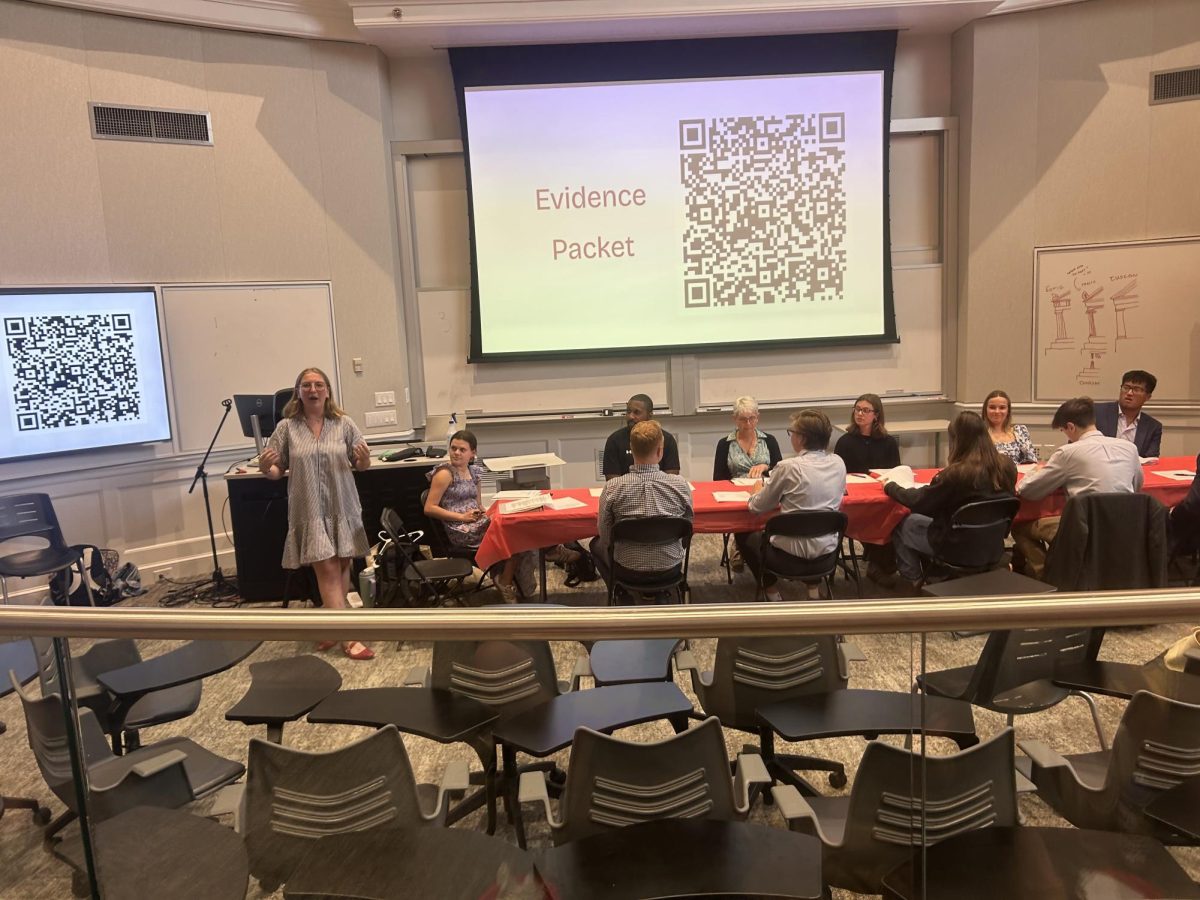
David Anderson Montes Lara
Honor Council Chair Maggie Woodward '26 speaks at a mock hearing in the Hance Auditorium.
The Davidson College Honor Council hosted a mock hearing on Monday in an effort to shed some transparency on its functions. The Council used a fictional case to walk students through each stage of the hearing process from opening statements to final accountability plans.
Honor Council Chair Maggie Woodward ’25 said the mock trial was an opportunity to connect with the student body in a way that PowerPoints or policy summaries do not. “Being able to engage the student body in whatever way possible is really important. When you have this interactive setting where students are able to witness how this process goes on not just in theory, but in practice, it sticks with people a lot better,” Woodward said.
Woodward said that the council made transparency one of its central goals this year. She hopes that opening up the process to the public will ease fears surrounding the Honor Council hearings and remind students that the Council is composed of their peers.
“We really don’t want it to be this topic people are scared to talk about,” Woodward said. “Just by putting a hearing out on the floor that people can view, I think it’s the peak of transparency making it clear what we do as a council.”
The fictional case chosen for the event involved a student accused of using artificial intelligence to complete a writing assignment, an increasingly relevant issue on campus. After presenting evidence and witness testimony, the panel deliberated and delivered an accountability plan, mirroring the real-world process.
The event clarified for some audience members how the Honor Council reaches decisions and why cases can take weeks to resolve.
“It was definitely eye-opening,” attendee Katherine Marshall ’25 said. “I think it’s really awesome that the current Honor Council is making such a big effort to […] genuinely try to add transparency to the whole process. It led me to wonder more about the details like how long cases take, or how the accountability plans are decided. It just made me realize how complex the process really is.”
Marshall also said that while the case seemed simplified due to time constraints, the mock hearing made her more interested in understanding what happens behind closed doors.
According to Honor Council Vice Chair Lily Radtke ‘26, the Council wanted to focus this year’s programming on re-establishing trust. “There’s been a lot of talk recently even in The Davidsonian about whether the Honor Code is ‘dead’ or outdated […] We wanted to show that it’s still very much alive. We have a really strong council that cares deeply about the community and wants to help students, not just punish them.”
Radtke added that the decision to focus the mock case around AI came from student input. “We asked students what kind of violation they felt was most relevant right now, and almost everyone said AI,” Radtke said.
Looking ahead, the Council plans to publish data on Honor Code violations and accountability plans from the past semester as part of a broader transparency initiative. They also intend to host events that promote academic honesty before issues arise, such as mental-health panels, study halls and drop-in Q&A sessions.
Woodward hopes that this year’s outreach sets a base that future councils can build on. “We’re only in these seats for a year […] it’s really important to make sure the Council is in a good spot when we leave.”
“The Honor Council feels a lot less mysterious now. It’s easy to criticize something you don’t understand but it’s a lot harder once you’ve actually seen it in action,” Marshall said.